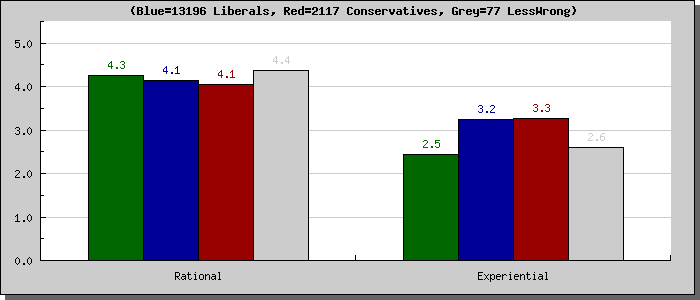YourMorals.Org |
||||
| Home |
Logout | Explore Your Morals | About Us | Links |
| Welcome gwern0@gmail.com - logout | ||||
|
The scales you completed are the Rational vs
Experiential Inventory developed by Epstein and colleagues (1996, 1999)
and the Cognitive Reflection Task, created by Frederick (2005).
These scales are two measures of an individual's cognitive style or the tendency to think in a systematic/rational versus a heuristic/experiential way. Increasingly psychologists and cognitive scientists are recognizing that humans process information using two different ways of thinking, or cognitive systems. When individuals are using the systematic/rational system their thinking is careful, deliberate, and thorough. It obeys the rules of logic and it usually produces the correct answer to a problem. However, for most everyday tasks such thinking is too slow and effortful. In contrast, heuristic/experiential thinking, as the name suggests, relies on mental short-cuts which are quick and effortless, but may sometimes lead to suboptimal decisions. This type of thinking relies on previous experience, intuitions, and emotions when arriving at a decision and it tends to be quick and effortless. Rather than reflect upon the various considerations or use logic, individuals in this system form a global impression of the issue by conjuring up vivid and emotional images of objects or events and use them to guide their judgments. Whether one uses systematic of heuristic thinking depends on factors such as one's motivation to be accurate, the importance of the task, and the availability of mental resources (e.g whether there are other distractions in the environment or wehther the person is very tired). We will not be able to function effectively if we relied solely on systematic or solely on heuristic thinking, and one is not better than the other. Both cognitive styles can be appropriate at different times for different tasks. However, individuals do tend to prefer one over the other. That is, some individuals rely heavily on the systematic/rational system, analyzing issues carefully and systematically in all situations. Others tend to prefer the heuristic/experiential system, deriving decisions from intuition, emotions, and "common sense". They tend to endorse statements such as: “I believe in trusting my gut feelings and hunches”. The reason why we are interested in individuals' proclivity for systematic/rational vs heuristic/experiential thinking is because it may help us understand how information processing affects moral judgments and decisions, as well as perhaps ideological stands on a variety of issues. The figure below shows your average scores on systematic vs heuristic thinking (in green) compared to those of the average Liberal (in blue) and the average Conservative (in red) website visitor. Higher numbers indicate stronger preference for that cognitive style.  To learn more about the Rational vs Experiential Inventory you may read the following article:
Here are the correct answers for the questions you answered on the previous page: |
|